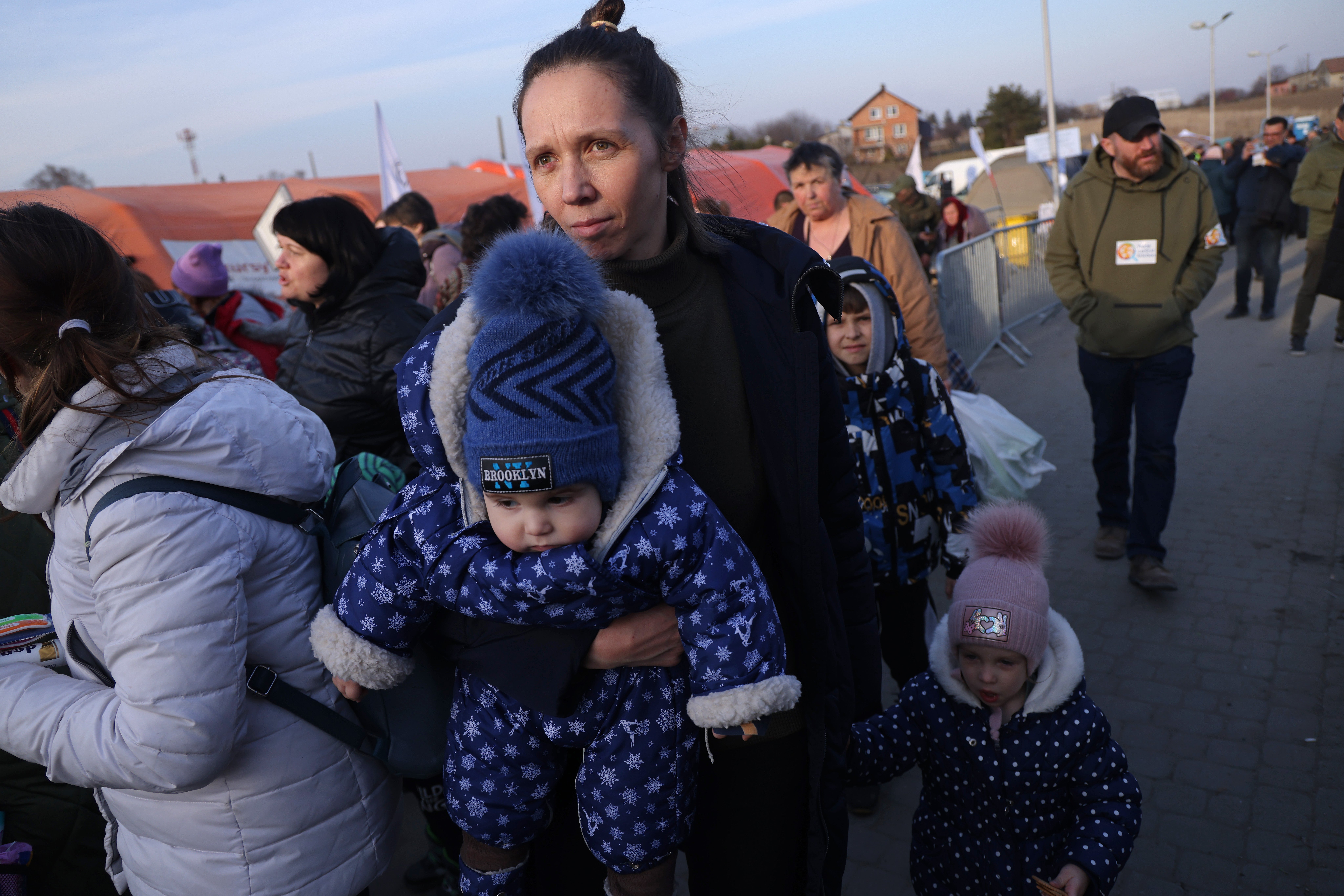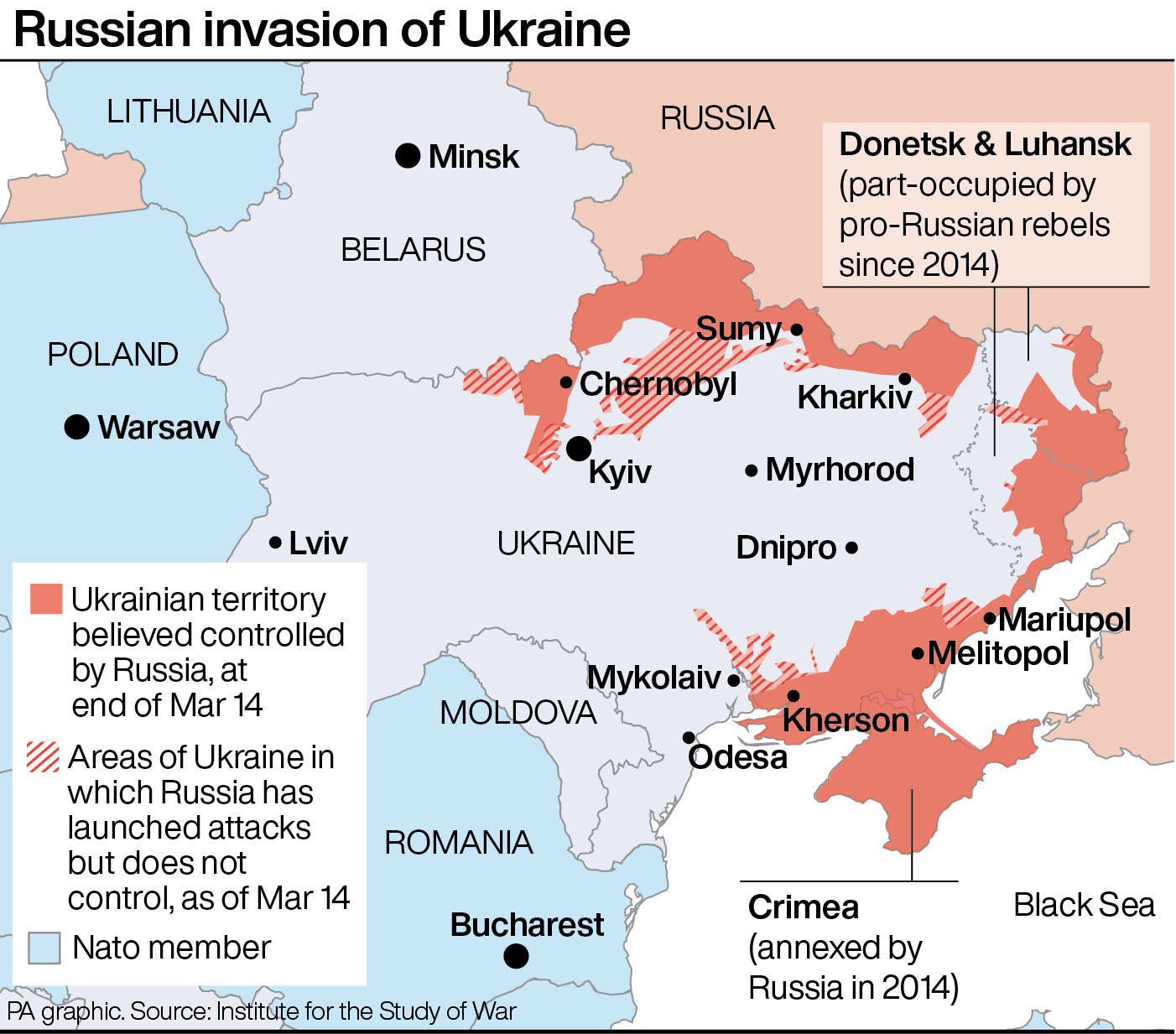Refugees fleeing Ukraine unaware of UK scheme to place them in sponsors’ homes, says Ed Davey
Exclusive: ‘Shambolic and amateur’: Lib Dem leader blasts operation of visa system

British government help for Ukrainians fleeing war has been branded “shambolic and amateur” by Liberal Democrat leader Sir Ed Davey after a visit to a crossing point at the Polish town of Medyka.
In an impromptu refugee centre, somewhat incongruously established in a disused Tesco supermarket, Davey saw charity workers from around the EU able to swiftly process new arrivals and assure them that sanctuary was awaiting them in Germany, Italy or Spain.
But Ukrainians hoping to seek refuge in the UK told him they had no idea how to go about it, and had heard it would be difficult and expensive to achieve.
Speaking to The Independent from the Polish border just moments after the official tally of Britons offering to open their homes to refugees reached 100,000, Sir Ed said that on the ground the scheme set up by Michael Gove seemed little more than a “PR exercise”.
“It’s difficult for people to even find out about it,” he said. “People are exhausted, traumatized and scared, they don’t know what the future holds, they don’t know where they are going to sleep.
“Even if they want to come to the UK, how are they even going to hear about this scheme? There’s no-one here to tell them about it.”
Davey praised the “amazing effort” by Poland welcoming queues of refugees – mostly women and children, with the occasional elderly man - which sometimes stretch 8-10km from the border as they wait to cross.
“I was taken to the border by the charity Caritas and it’s been really emotional, as you can imagine,” he said. “The scale is just enormous. It is a mass refugee crisis, just unimaginable.”
Most of the refugees he saw were women and children, with a few older men, as husbands and sons had been left behind in Ukraine to fight Vladimir Putin’s invasion force, he said.
“They were carrying what possessions they’d managed to gather up in a few bags. Some of them had their pets – I saw dogs, cats, a tortoise, one person with their pet rat in a sock. It was humbling.
“I spoke to a mother with a 12-year-old son who’d got up very, very early this morning to come from their home in Kharkiv which they said was bombed to smithereens. Others had taken two or three days to get to the border.”
Once they were ferried to the supermarket refugee centre, they found representatives of NGOs (non-governmental organisations) from a wide range of European countries, all able to arrange transport to airports and flights to a place where accommodation was waiting for them, thanks to the EU’s decision to offer visa-free entry for three years.
But while there were many British charity workers helping with immediate needs like food and water, there was no sign of anyone to guide them through the complexities of making an online application to be matched with a host household in the UK, said Sir Ed.
“I’m afraid the lack of official-supported British help here is really noticeable,” he said.
“EU countries were represented by charities who were there to welcome people who wanted to go to their country. If you wanted to go to Denmark, you went to the the Danish area, the same for Germany or Spain, and there were people saying ‘fine, we’ll make it happen for you’.
“No British representation in Tesco.”
Sir Ed said that UK charity workers on the ground had privately told him that the UK visa scheme – open only to those with sponsorship or with family in Britain – “doesn’t begin to match up with the scale of what is needed”.
“It’s a shambolic amateur effort by the government, basically contracting it out to social media as far as I can see,” he said.

“It’s just a barrier. There should be a government-supported group of NGOs who are able to be at the reception centres - like other countries are - to say ‘You want to come to UK? We can get that facilitated for you. We’ll get you on the coach will take you to the airport, and we’ll fly you back.”
While checks and visas for those coming to the UK may be needed, the priority should be getting people to a place of safety, said Sir Ed.
“Whatever process we end up with, there’s got to be some paperwork, but do it in the UK,” he said. “The government are still not making it easy for people who want to come.
“There are lots of British people here trying to help. My view is British people have got real compassion. They want to help and the government’s pretending that it is helping, but it’s just not.
“The government has really got to rethink its scheme. I think they’ve got to be out here, they’ve got to facilitate these people coming to the UK.”
Join our commenting forum
Join thought-provoking conversations, follow other Independent readers and see their replies
Comments
Bookmark popover
Removed from bookmarks